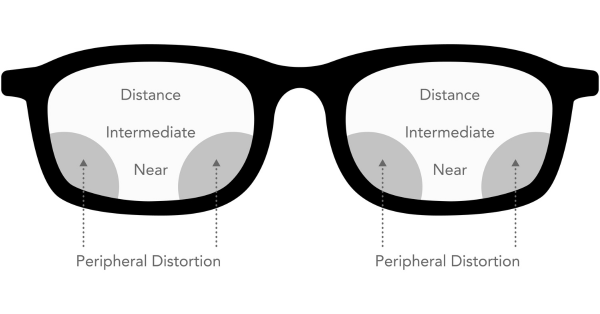Explaining the Difference Between Bifocals and Progressives

You probably get a lot of questions in your practice during patients' eye exams. Many questions come up about the different types of lenses. Many people are asking questions about the difference between bifocal and progressive lenses. If your patients are asking the same questions, here are some suggestions on how to answer that will help eliminate their confusion, and hopefully, provide you with some additional revenue. That’s a win-win!
First, let’s set the stage. Multifocal lenses typically address the needs of your middle-aged to older patients who are starting to feel the effects of aging. Many start to experience presbyopia, which is the gradual loss of elasticity in the eyes and the resulting difficulty to focus on objects close up. This condition is very natural, but often annoying, and usually becomes noticeable in people in their early to mid-40s. It may continue to worsen until around age 65.
It’s at this point people need something more than a single vision lens in their prescription eyeglasses. They’re going to need vision correction that has an additional magnification in the lens to help the eye focus on up-close objects.
Bifocals
All bifocal lenses work the same. A small portion of the lens has the power to correct your patient’s near vision. Since people usually look down to read or look at object close to them, this area is at the bottom of the lens.
The lens segment (or “seg”) that is devoted to near vision can be in several shapes:
- Flat-top (sometimes called half-moon, straight top, or D-segment)
- Full bottom half of a bifocal lens (called “Franklin” thanks to Benjamin Franklin, Executive, or E-style)
- Round

All of these lenses have a visible line. The line in the round seg is less noticeable than the lines in flat-tops and Executive styles. There is also something called “invisible bifocals” or “no line” which essentially is a round seg that has been buffed so the line doesn’t show. This can cause optical distortions, however. If an invisible line is desired, it’s usually better to go with progressive lenses. Modern technology has also allowed an updated design that has significantly less distortion when using the Shamir Duo.
Progressives
Just like flat-tops, progressives give your patients the ability to see far and near. Progressive lenses offer a smooth transition in lens power for all viewing zones: distance, intermediate, and near distances without a line.
Since flat-top, executive, and round lenses provide only two optical powers – distance vision for seeing across the room, and near vision for seeing up close – patients may have to “bob” their heads in order to see object in the intermediate range, such as computer screens or items on a grocery store shelf.
Wearers have to sit closer to the screen and tilt their heads back to see the screen. Not only is this constant head bobbing and tilting annoying, this unnatural position can lead to muscle strain and neck pain when used for extended periods.
head bobbing and tilting annoying, this unnatural position can lead to muscle strain and neck pain when used for extended periods.
Therefore, it’s easy to justify to your patients the advantages of progressive lenses when they buy their their next pairs of glasses, especially for those with heavy computer use. Bifocal lenses can be less expensive, but today’s advanced progressive designs offer comfort and functionality that will be worth the investment. Not only will your patients appreciate the difference, they will usually be very happy they spent a little bit more.
Please be aware that IcareLabs sells premium progressive lenses for less than some labs' prices for bifocal lenses.
About IcareLabs
Icare Industries was established in 1968 by John W. Payne. More than 56 years later, Icare Industries is managed by Mr. Payne's grandsons, Danny Payne (President) and James Payne (Vice President) and is still family-operated with long-standing quality and money-saving commitments to its customers.
With our in-house efficiencies, recently upgraded state-of-the-art lab, outstanding on-site customer service and the fact that we don't hire expensive outside sales people, you are sure to save money on your monthly lab bill.
Need more information on specific bifocal and progressive lenses? Check out our Resource Center

